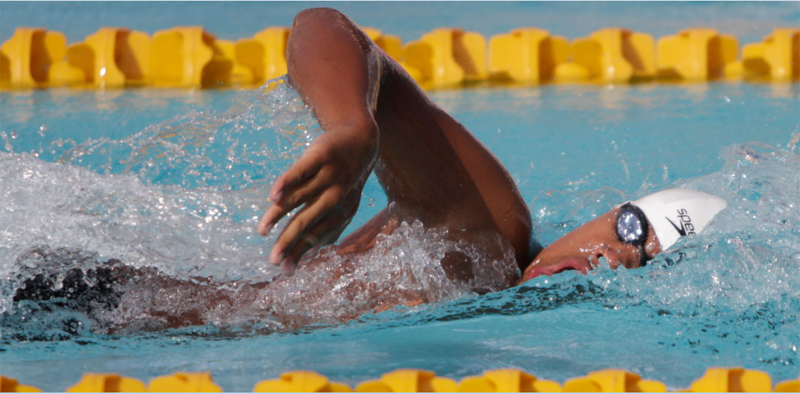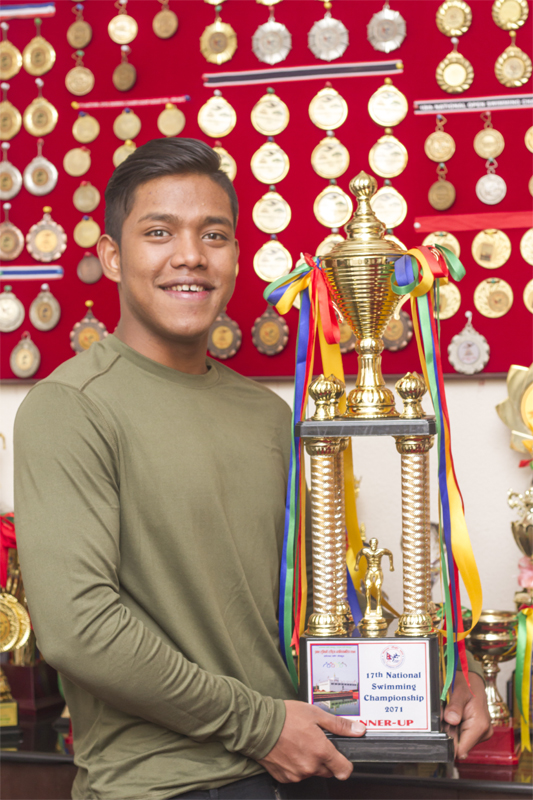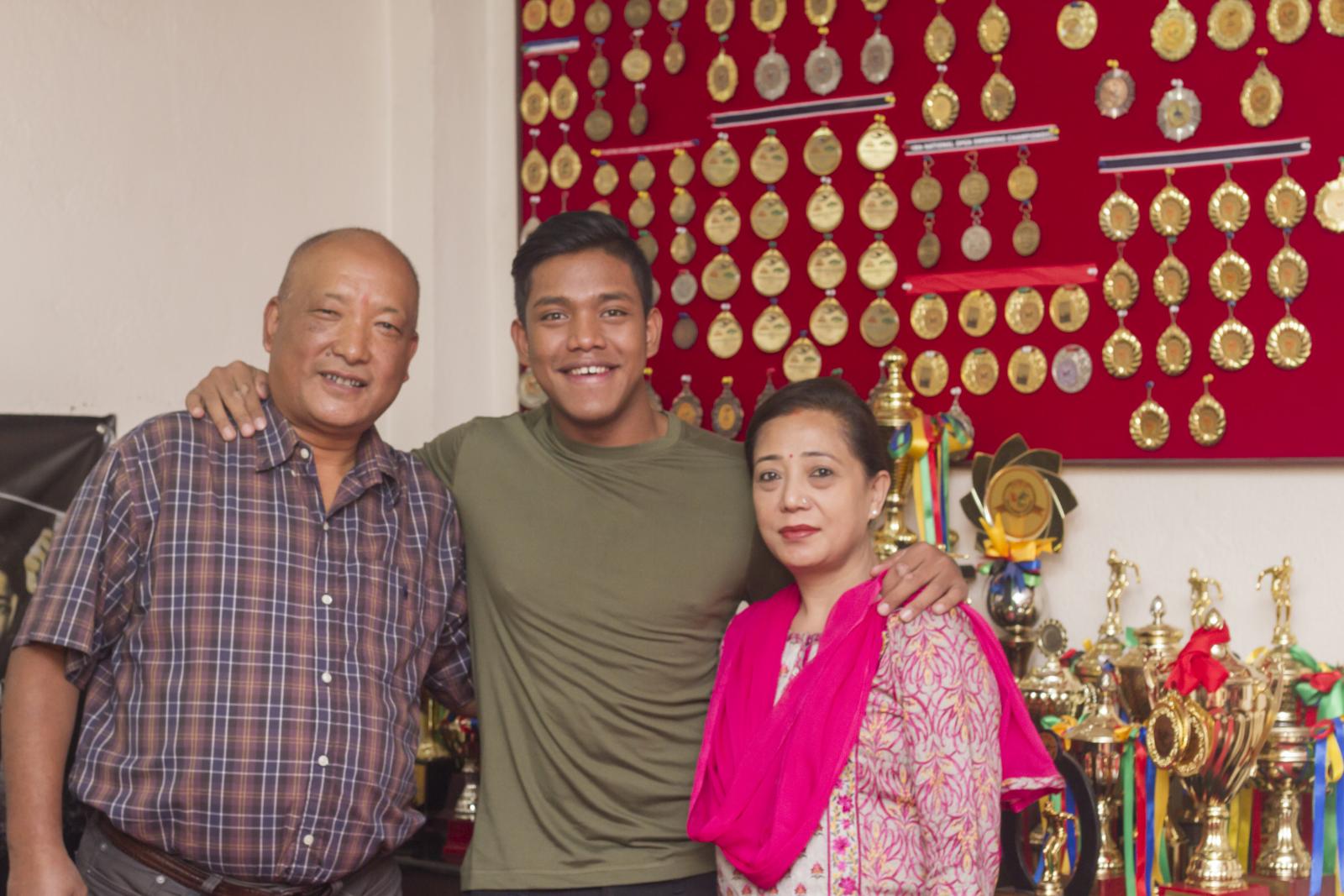Time Management and Commitment - The Key to Success
Nothing is unattainable as long as you invest the right amount of time and dedication to the things that you want to achieve. Sirish Gurung is the perfect example of success through such effort.
 Currently in his late teen, Sirish Gurung has achieved what most youths only dream of achieving at that young age. A competitive swimmer holding a national record, a proficient player of multiple musical instruments, and a student with good grades -- all these personas establish him as a role model amongst the Nepali youth. However, being a child prodigy comes at a cost, and he has had his fair share of bitter experiences while growing up. After a warm welcome, Sirish recalled for us the major events in his life while his mother looked at to him with pride and appreciation. The conversation with Sirish, narrated below in first person, took place in a room full of medals and trophies that solely belonged to him.
Currently in his late teen, Sirish Gurung has achieved what most youths only dream of achieving at that young age. A competitive swimmer holding a national record, a proficient player of multiple musical instruments, and a student with good grades -- all these personas establish him as a role model amongst the Nepali youth. However, being a child prodigy comes at a cost, and he has had his fair share of bitter experiences while growing up. After a warm welcome, Sirish recalled for us the major events in his life while his mother looked at to him with pride and appreciation. The conversation with Sirish, narrated below in first person, took place in a room full of medals and trophies that solely belonged to him.
When I was a kid, I used to be a troublesome child to my parents since I was full of energy and I used to run around places. Whether it be dance classes or football matches, I used to run away from all these activities. But, when it came to swimming it was kind of difficult to run away from the pool. So, my parents got me enrolled for swimming classes when I was about four years old. Since then I got involved in the training as well. My first trophy was handed to me when I was five years old; I was awarded as the best swimmer at a tournament held in Kirtipur. This actually happened after six months after my swimming classes, and the trophy motivated me in terms of training. And so, my interest in swimming grew stronger, and I started participating at inter-school tournaments as well.
 At seven years of age, I won a bronze medal for swimming in the under 10 category at the LA Cup which was held at Little Angels School. After that, I started to get more serious in my trainings, which were followed by participation in national tournaments. In 2008, Beijing hosted the Olympics. I saw my seniors get selected for the event and that propelled be to train harder. I was only ten years old back then, and since that day taking part in the Olympics became my primary goal. So, I put in more efforts in my training with the aim of participating in the 2016 Olympics, which I did. I guess I was eighteen years old by then.
At seven years of age, I won a bronze medal for swimming in the under 10 category at the LA Cup which was held at Little Angels School. After that, I started to get more serious in my trainings, which were followed by participation in national tournaments. In 2008, Beijing hosted the Olympics. I saw my seniors get selected for the event and that propelled be to train harder. I was only ten years old back then, and since that day taking part in the Olympics became my primary goal. So, I put in more efforts in my training with the aim of participating in the 2016 Olympics, which I did. I guess I was eighteen years old by then.
Before the Olympics, my friend Sophia along with me got scholarship offer to train in Thailand. This happened around 2015, the year Nepal got struck by a major earthquake. Swimming season was about to commence when the earthquake struck, and our training regimes were hampered. We couldn't go to training because obviously our life was at stake. That was when we got the offer and by the time we reached Thailand, we were out of shape. The first two months of training were hard since we were out of shape and the training routine was really difficult. We had to train four times a day and during those sessions we covered about 16 to 18 kilometers in the pool. So, after all those efforts the news of me being able to take part in the 2016 Olympics made me happy. When I got there, at the Olympics, the fact that this event takes place once in four years and a minor mistake can cost you the opportunity made me really nervous. Despite that, I was successful in breaking the national record in the 100 meter freestyle competition. I also got to meet many experienced personalities that I used to look up to from my computer screen. So, it's safe to say that I had a pretty good experience at the Olympics.
I am really thankful towards my parents, because all of these achievements that I have achieved till date, should be credited to my parents. They never constricted their focus on my studies and got me involved in many extracurricular activities. They've been really supportive and they're the ones responsible for managing my training sessions and diet since my childhood.
Sirish's mom added, "Well my son is a quick learner and that is one of the reasons why he was involved in so many activities. As a parent, we just supported his interests. In order to excel in something you have to be focused on that particular thing. That's what his coach suggested us as well. So he opted to swim."
 Sirish continues, "My principle in life is that time management is a very important factor in dealing with things in your life. My parents taught me the importance of time management and I still stick to that principle. I've witnessed many, including my parents, who consider sporting and any other activities as an obstacle in studies. In my school days I used to train in the evening, mostly for three hours - two hours of training and one hour for coming to and fro from the training. Most youths spend that amount of time on leisure activities such as using social media sites, watching TV, gossiping and many other unproductive activities. I just utilized that time to become this successful. I was always involved in different activities since a young age and I rarely got any free time. Then comes the part where I committed a lot of time to swimming. For me swimming was like a meditative journey.
Sirish continues, "My principle in life is that time management is a very important factor in dealing with things in your life. My parents taught me the importance of time management and I still stick to that principle. I've witnessed many, including my parents, who consider sporting and any other activities as an obstacle in studies. In my school days I used to train in the evening, mostly for three hours - two hours of training and one hour for coming to and fro from the training. Most youths spend that amount of time on leisure activities such as using social media sites, watching TV, gossiping and many other unproductive activities. I just utilized that time to become this successful. I was always involved in different activities since a young age and I rarely got any free time. Then comes the part where I committed a lot of time to swimming. For me swimming was like a meditative journey.
Before the Olympics, I have to admit that my social life was dead. Training was my primary concern and so I missed a lot of social occasions and friendly gatherings. I used to get the urge for all these thinks, but I somehow always put my focus on training. Breaking the national record at the Olympics somehow became a dream, an obsession, for me. That was one of the key driving factors in my journey towards the event. I never took training as a burden; instead I considered it as a routine part of my lifestyle.
There were setbacks throughout my journey that I had to go through. Possessing such achievements at a young age even raised some envy and distaste among few people. My examination routines would sometimes collide with my swimming dates, and I had to convince my teachers to rearrange the dates which, sometimes, left them disappointed. I even got punished at times, at college, for missing out on classes due to my training regimes. Eventually, with good marks the teachers were content with my attendance.
 Personally, I myself want to excel more at what I'm currently doing in the sports field and I have friends who share the same desire as I do. But, here in Nepal, it is quite difficult to survive as a sportsperson. I think the lack of facilities, proper schedules, and infrastructure, and political, social, and economic issues hinder the progress of athletes. So, I'm looking at other options in order to continue my studies and plan out my future. Currently, I'm planning on joining a college for my bachelor degree after a break from my studies. I've achieved my goal, and now it's time for me to take another step towards a better career.
Personally, I myself want to excel more at what I'm currently doing in the sports field and I have friends who share the same desire as I do. But, here in Nepal, it is quite difficult to survive as a sportsperson. I think the lack of facilities, proper schedules, and infrastructure, and political, social, and economic issues hinder the progress of athletes. So, I'm looking at other options in order to continue my studies and plan out my future. Currently, I'm planning on joining a college for my bachelor degree after a break from my studies. I've achieved my goal, and now it's time for me to take another step towards a better career.


